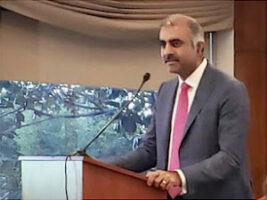Synthesis of speech at IILM Second International Conference, January 10, 2015
Rethinking our current mindsets and approach to consumption is critical for ensuring sustainable development. Gandhiji captured the problem beautifully, “there is enough for everyone’s need but not for everyone’s greed.” However, solving this problem is easier said than done. Our current mental and economic models at all levels – individual, corporates, society, are driven by growth. They are about ever increasing needs and desires and a constant race to fulfill them. The desire for growth is a source of motivation and a driver for human endeavor. It is this desire for growth that has helped the human civilization develop over many millenniums. However, the ever increasing desires and search for growth is also the cause of stress at an individual level, lack of judgment and unethical behavior for corporates, and increasing crime, pollution and variety of disasters for our societies.
This is a complex issue and I do not have “silver bullet” answers. However, I would like to share with you some of my practical experiences on how I have tried to address this challenge in my different roles – an individual, a corporate leader and a citizen & society leader.
- Individual
The root cause of the consumption debate starts at the individual level. It is the ever increasing individual desires that eventually are reflected in our collective behaviours as a society. Most of us are caught in a never stopping treadmill of desires. We work hard towards meeting our desires. However, our desires keep on rising. As soon as we fulfil a cherished desire, a new one pounces upon us. The treadmill of desires just keeps going faster and faster and it becomes very difficult to get off it. This leads to increasing stress and loss of peace of mind. Stress is not just losing mental peace but is one of the key root causes of diseases like hypertension and diabetes.Yoga and meditation has been a great help to me in finding balance in life. I have been doing “Art of Living” for over 13 years and in recent years have started reading the ancient Indian spiritual texts especially The Bhagavad Gita. These have helped me understand life better and go deeper within myself. As you do that, the feverishness of desires reduce and you feel contended and at peace with yourself.We live in a material world so it is not possible to run away and become a hermit, and nor do our ancient Indian texts encourage that. However, it is possible and desirable to find a balance between spirituality and materialism in our daily lives. I would encourage all of you to explore spirituality and adopt some spiritual practices in your daily lives. India has such a great heritage in spirituality and is an area where we can show the way to the entire world. - Corporate Leader
Many economic models have been experimented with in recent centuries, but eventually capitalism has emerged as the most effective model. The entire basis of this model is free markets and growth. If you look at how capital markets value companies, growth expectation is clearly the biggest driver of value. This focus on constant growth leads to many problems. The over-leveraging of companies, the high-levels of debt in financial institutions and the resultant (and frequent) financial crisis are all an outcome of this obsession with growth. At the same time, we do not have an alternate economic model yet. Despite its many ills, capitalism and growth focus is still the most tenable economic model today.I am sure that over a period of time our thinking will evolve and newer economic models will emerge. The question is what can corporate leaders do today? We can perhaps differentiate between good growth and bad growth. The former benefits many while the latter is self-centred and often leads to disastrous consequences.The way many companies are trying to focus on “good growth” is by putting customers above profits. Companies that are truly customer centred focus on identifying and serving the genuine needs of their customers. They place the customers’ interest above their own interest. They ignore short-term profit considerations knowing that if you do the right things for the customer, profits will follow in the long-term. In my corporate experience, the customer-centric approach is the most important mantra for ensuring “good growth” and building a hi-quality business. Most companies that have successfully grown over a long period of time (including the two that I have had the privilege of working with – Fidelity and McKinsey) have customer centricity as their guiding mantra. - Citizen and Society Leader
Over the past 4 years, I have had the opportunity to Co-Chair and now Chair the NASSCOM Regional Council for Haryana. Given that the IT-BPO industry has over 3 lacs employees in Gurgaon, the future of the industry there is very tied to the health of the city. This has given me a great opportunity to understand the challenges of a new city like Gurgaon. One of the major challenges facing Gurgaon and the industry there is traffic congestion in the city. The city is getting choked with traffic, there is a high rate of accidents and air pollution levels are one of the highest in the world.This choking of the city is an outcome of our obsession with cars and the car-oriented planning we have today. Cars are an important status symbol and all of us want to move to bigger cars. The speed at which cars are increasing significantly outstrips the building of new roads.The more advanced cities in the world (especially European cities e.g., Copenhagen, Amsterdam) have adopted a very different planning paradigm. They have focussed on provision of public transportation and encouraging walking and cycling. Over time they have shown dramatic results – not just changing behaviours, but eventually improving pollution levels and even reclaiming roads and converting them into public parks.At NASSCOM, we have been championing this cause of “Active Commuting” (walking, cycling, use of public transportation) for the past few years. This requires number of interventions from the government, where we have struggled to get action from them and has been a source of much frustration to us. Over the past 1.5 years, we changed our approach from just trying to influence the government to focusing on raising awareness about “Active Commuting” and getting people to change their habits. We walked the talk by getting many CEOs from our industry to walk, cycle and use public transportation. This has now become a significant movement in Gurgaon also resulting in outstanding citizen initiatives like the Raahgiri Day where many roads are re-claimed/blocked on Sunday mornings for pedestrians. All of this has forced the local administration to take notice and they are beginning to make some steps to encourage walking, cycling and use of public transportation.
The reason I shared this example was not just to bring out why “active commuting” is so important for our cities to be sustainable, but to also bring out the value of citizen initiative. Often as citizens we are held back by the enormity of changing a large and seemingly unresponsive system. However, there is great value in individual action. Our individual actions add up and have the power of making a significant difference to our society.
Rethinking our consumption models is a very complex question, where there are no easy answers. However, I am delighted that these discussions are now taking place and becoming more main-stream. In the end, I would like to reiterate my three learnings on how to “rethink consumption” as a driver of sustainable development. At the individual level, it is to balance spirituality and materialism; at the corporate level, it is put customers before profits; and for our society, it is for all of us as citizens to focus on our individual actions and behaviour changes.



